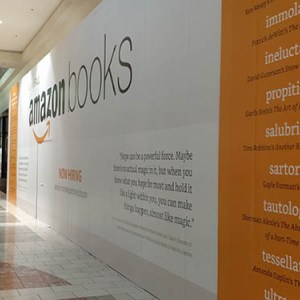I recently watched You’ve Got Mail for the first time (I know, I know). If you haven’t seen it yourself, it is about a children’s bookstore owner (Meg Ryan) who exchanges emails with the man opening up a corporate bookstore just around the corner (Tom Hanks), except they don’t know the identity of the other person. The movie was released in 1998, so there are a lot of fun and outdated cultural references, one of the more prominent ones being in the name itself: “you’ve got mail,” the iconic chime whenever someone with an AOL email would log in.
What really struck me, however, was the conflict between the local, specialized bookstore and the larger, corporate one. It struck me because I’m living that right now, having just been hired at the third installment of Amazon Books.
Leaving a full-time job to go back to graduate school, I felt the need to continue working in a part-time job, and miraculously, the listing for an Amazon Books store associate popped up at the same time. I had always wanted to work in a bookstore, and they were specifically looking for part-time workers, so it seemed like fate. I applied, interviewed, got the job, and celebrated the fact that my plans were working out.
But I was still torn. Almost all you hear about Amazon—at least on the publishing side—is that they’re monopolizing the book industry. They’re using it to boost their bargaining power against publishers, so that they can get more money from them. And when they’re (virtually) the only retailer, they’re going to boost prices so that they’re expanding their profit margins from both directions. With the retail locations opening up, some people are resistant to the idea, and I understand, because I might have been one of them.
Once we started training, however, it not only became difficult to view it as an us-against-them situation, I no longer wanted to. There is such a strong desire to fulfill the customer’s needs that it is planned into everything in the store. The faced-out placement of the books is intended to help customers discover titles they may have passed over when it was just the spine facing out. The review cards give the reader another chance to understand the book past what’s been presented in the summary. The store is stocked with books tailored to each city to provide a better chance for each customer to find a book that they love.
Even still—maybe more so since I’ve started working—I don’t consider Portland’s independent bookstore community in danger. Independent bookstores have always had a strong following, even throughout the recession. And the addition of another bookstore isn’t likely to shake that up, but rather add to the availability of books in the Tigard area.
After Meg Ryan’s bookstore closes in You’ve Got Mail, she goes to visit Tom Hank’s corporate bookstore. She makes her way to the children’s section, only to find kids and their parents still enjoying the books they love. We get the sense that Meg Ryan’s character can’t resent this store, because these children are still finding their way into the world of books—the same one that drove her passion to continue on her mother’s bookstore and start her own writing at the end of the movie.
And isn’t that what it’s really all about? our love of books?

